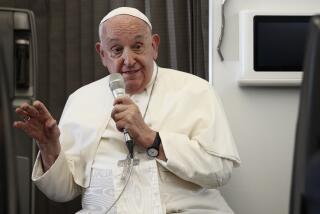Extend Benefits to Non-Citizens, Mahony Urges : Health: The cardinal calls on Clinton to revise reform proposal to include illegal immigrants. Access to medical services is a right, not a privilege, he says.
- Share via
Declaring that health care is a human right and not a privilege of citizenship, Cardinal Roger M. Mahony on Wednesday called on the Clinton Administration to extend universal health insurance to illegal immigrants.
Covering non-citizens would be a major departure from the sweeping health care reform proposal unveiled last week by President Clinton. Illegal immigrants are not specifically eligible for guaranteed health benefits under the President’s plan.
But in an address to members of the Los Angeles City Council, local state legislators, Catholic hospital administrators and Latino business leaders, Mahony said the church is resolute in its belief that undocumented immigrants are entitled to basic and preventive medical care.
“Access to quality, adequate and affordable health care is a human right, not a privilege of class, economic status, citizenship or other qualifications,” Mahony said, speaking at a public policy forum hosted by the archdiocese at St. Vincent’s Medical Center in Los Angeles.
As archbishop of the nation’s largest Roman Catholic archdiocese, which has an estimated 1 million illegal immigrants among its 4.5 million members, Mahony was far more explicit in defending their health care rights than were his fellow Catholic bishops in June.
The National Conference of Catholic Bishops affirmed the church’s constant teaching that every person has a right to health care. But illegal immigrants were mentioned only once in the 10-page resolution approved in June, in a sentence that also mentioned the needs of the elderly, unborn children and AIDS patients.
Mindful of possible objections to the costs, Mahony asked what the financial and social price tag would be if health coverage were denied. “What are the risks we run as a society by not providing this care? What will be the impact on the children of the undocumented, who are the most innocent, most vulnerable and the least powerful in this political debate?”
Mahony argued--as have immigrant rights advocates--that undocumented immigrants pay more in taxes than they consume in services. “The issue is not that the undocumented are not paying into the system, but that local governments are not getting their fair share of the taxes that are being paid to provide those services,” the cardinal said.
Aside from the moral imperatives that drive its position, the Catholic Church is deeply involved in health care delivery in the United States, with 600 hospitals and 1,500 long-term and specialized care facilities that serve 20 million people annually. These hospitals, including 16 in the Los Angeles Archdiocese, face the same escalating costs confronted by other health care providers.
Mahony’s appeal comes as congressional hearings are under way in Washington over the Clinton proposal. Extending health coverage to illegal immigrants would be politically difficult, the Clinton Administration says.
Although illegal immigrants are not specifically eligible for guaranteed health benefits under the President’s plan, they could benefit indirectly. For example, employers would be required to pay health insurance premiums for all their workers, regardless of immigration status. But immigrant rights advocates have said employers are under increasing pressure not to hire undocumented workers--which would prevent access to the Clinton health care reforms.
The Clinton Administration is proposing a $1-billion fund to cover the costs of hospitals in treating emergency room patients, many of whom are not U.S. citizens or are indigent. But the fund has been deemed woefully inadequate. Gov. Pete Wilson said California would spend more than $1 billion for such care this year because federal law requires hospitals to give emergency medical aid to everyone, regardless of their citizenship or ability to pay.
As his fellow bishops did in June, Mahony also said Clinton’s plan should include “a preferential option for the poor and vulnerable,” comprehensive reform, effective cost containment and reflect a “consistent respect for life” from conception to natural death--a view that excludes abortion funding.
More to Read
Sign up for Essential California
The most important California stories and recommendations in your inbox every morning.
You may occasionally receive promotional content from the Los Angeles Times.










